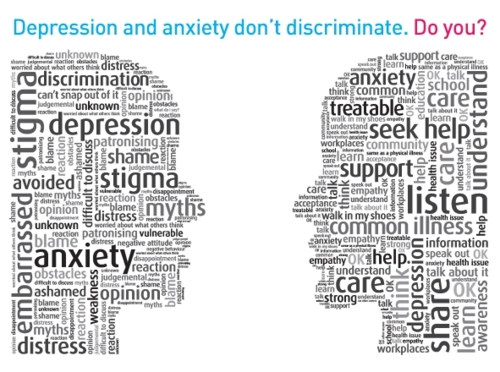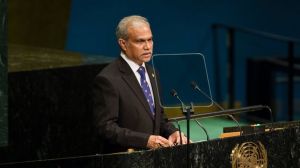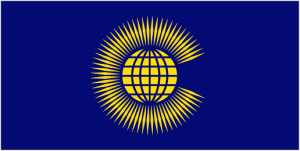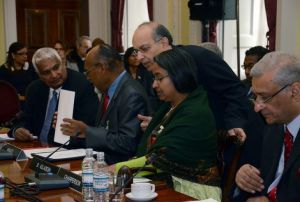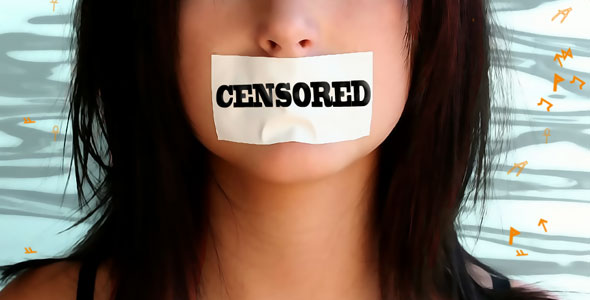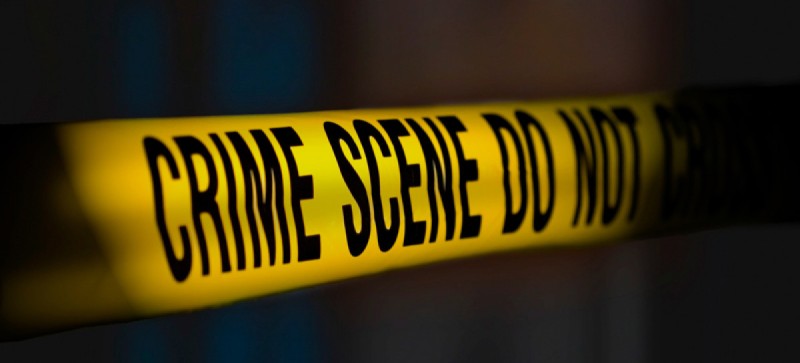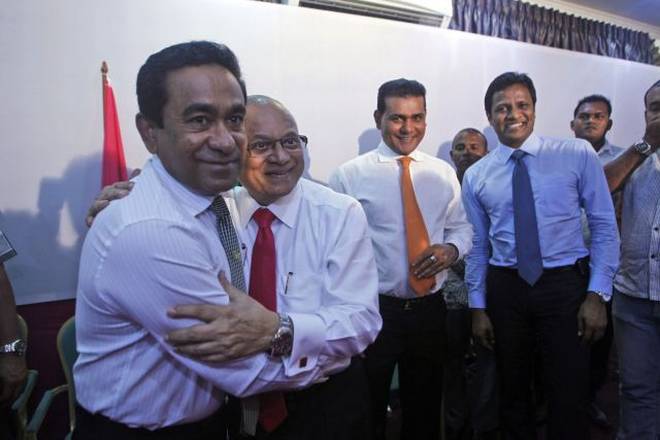
President Abdulla Yameen Abdul Qayyom with his half-brother, former President Maumoon Abdul Qayyoom and coalition partners. Source: The Hindu
On 17th of November 2013, President Abdulla Yameen Abdul Qayyoom was sworn in as the 4th elected president of the second republic of the Maldives. With the blessings of his half-brother, former President Maumoon Abdul Qayyoom (who is now in jail), and coalition partners that included the likes of Qasim Ibrahim, leader of Jumhooree Party (now living in exile in the UK), and religious cleric Sheikh Imran Abdulla, leader of Adhaalath Party (now serving a hefty jail sentence on charges of terrorism), President Yameen managed to clinch the victory by garnering 51.39 per cent of the votes in 2013’s runoff election. We are now coming towards the end of President Yameen’s first term. The Constitution of Maldives allows a sitting President to contest for a second term; two terms being the maximum number allowed for any President stay on in the position.
One of the most prominent features of President Yameen’s presidency would be his contentious relationships with his vice presidents. The first being Dr. Mohamed Jameel, who was his vice presidential candidate, who fled the country amidst the dirty politics that took place to remove him from office. He too is now living in exile in the UK. The second vice president, Mr. Ahmed Adeeb, who came in with all the glamour and pomposity that had been afforded to him through his rise to stardom in President Yameen’s inner circles, fared even worse. Accused of plotting to assassinate the President, Adeeb is now languishing in prison, looking to serve consecutive jail sentences that would in all probability place him solidly behind bars for the rest of his life. President Yameen’s third vice president Mr. Abdulla Jihad, is the only candidate who seems to have stuck, who has served in previous administrations as the Minister of Finance, the Governor of the Central Bank, and even as a member of the Civil Service Commission.
President Yameen’s coalition campaigned with a manifesto entitled the Yaqeen Manifesto. Special focus was given to areas such as the fisheries sector, promising an income for fishermen even during those periods in which they are unable scrounge up enough of a catch to make a viable income out of it. Empowerment of women was also a notable pillar of this document, promising the female workforce that policies would be made to pave the way for women to work from home. Another pledge was to establish reliable childcare centers subsidized by the government; once again to pave the way for the female workers to play a more contributory role in the labor force. Come today, none of these policies have fully materialized on the ground.
While the public is geared to vote on Sunday (September 23rd 2018), to elect the leadership of this country for the next five years, no one can accuse President Yameen’s administration of having being an uneventful one. Dogged by one scandal after another, which forced the incumbent to tighten his hold and oft times reveal his true colours, President Yameen’s presidency has been one of the most dramatic of reigns, perhaps even within the South Asian region. With his foreign policy strongly China-centric, President Yameen’s regime has sidelined India and other neighbours, and continues to snub the European Union and the US for “meddling with the country’s sovereignty”.
This article is an attempt on my part to take a look at President Yameen’s policies during his five year term with as much of an objective mindset that I can muster. It takes into consideration the good, the bad, and the despicable about his government. These are based on various news articles that I have read as well as my own beliefs when it comes to his developmental agenda and good governance. Having an avid interest in public policy, I have this drive to try and understand leaders, their policies, the implementation of said policies, and the idiosyncratic factors that defines a leadership, which I believe goes a long way towards establishing key moments of any administration.
The Good:
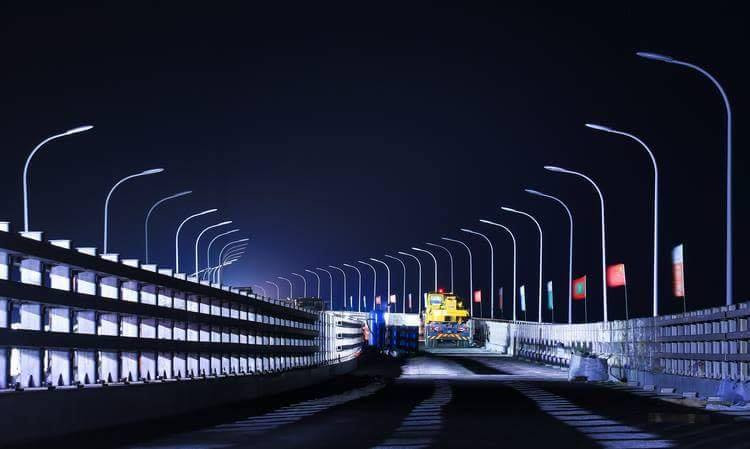
Sinamale’ Bridge. Source; Raajje MV
Whatever good that has come out of President Yameen’s first five year term belongs in the “infrastructural development” category. President Yameen’s presidency will be remembered for the infrastructural development that it brought to certain selected areas of the Maldives, garnering him what little support he has been able to muster throughout the country. How these projects were carried out, at what cost; that is not the focus of discussion at the moment. Highlights of some of the key projects are listed below.
- Sinamale’ Bridge: First pledged by President Maumoon during the final years of his 30 year dictatorial regime, the credit for realizing this dream would undoubtedly belong to President Yameen. The bridge which measures 2.1 in kilometres, connects the capital Male’ with the Velana International Airport (VIA), as well as the island of Hulhumale’ which is hailed as part of the Greater Male’.
A total of 200 million US dollars were reportedly spent on the bridge, out of which 116 million of it was given as free aid from the Chinese government, 72 million procured as loans from China, and lastly with the Maldivian government having spent 12 million.
Inaugurated on the 30th of August 2018, with the largest fireworks display this country has probably ever seen, the Sinamale’ Bridge is definitely the pride and joy of this regime. All squabbles regarding the bridge aside, connectivity is always a good thing, especially for those who travel between Male’, the airport, and Hulhumale’ on a daily basis irrespective of the turbulent weather conditions at times. Connectivity also ushers in prosperity, which is undeniable.
However, it remains to be seen the tariff the government will impose as toll charges on those who use the bridge. In the meantime, the bridge remains open for use, free of charge, until most likely the elections are over, and the presidency once again secured. - Implementation of water and sanitation systems in multiple islands: According to PSM, when President Yameen was sworn in, only 30 islands out of the 190 inhabited had established sewerage systems, with only four having proper water systems in place. By mid-June of 2016, 10 islands had sewerage systems established, and 10 had proper water systems. At the same time, 53 islands had ongoing sewerage projects in place whereas water projects were ongoing in 40 islands.
Having traveled to a mere handful of islands for work, I have also come across the lack of proper water and sanitation facilities in islands, a sad state and indignity that people have suffered for so long. These are basic services that should have been established long back, but sadly has not been the case. - Implementation of airports across the country: Being an island nation, one of the biggest challenges to our development remains the scattered nature of our geography, with sparsely populated islands strewn across the country. Traveling by sea has always been the norm, but changing weather patterns and advancements in technology has meant that there is more of a demand by people to be able to travel from one point to the next without the hassle of rough seas and the time incurred. The most contentious of these projects would perhaps be the airport that was inaugurated at HDh. Kulhudhuffushi on 21st September 2018, during which the President stood in the pouring rain and pleaded the people to vote for him at the polls on Sunday.
- Repairing the roads of Male’ City: It was incumbent regime that kick-started the ambitious project of repairing and repaving the roads of the congested capital city of Male’. Initial plan was to complete a total of 13 roads, the work on the main road Majeedhee Magu being scheduled from 1st of October 2016 to 4th January 2017. However, through a myriad of delays, the work was completed only towards the end of 2017. The other roads planned, still remain as they are, with parts of the outer road of Bodu Thakurufaanu Magu having undergone a tremendous facelift to facilitate the inauguration of the Sinamale’ Bridge.
- The Industrial Village Project: On 13th January 2016, the Ministry of Housing and Infrastructure signed an agreement with the Maldives Transport and Contracting Company (MTCC) to develop an industrial village in the capital, for which land was reclaimed from south of Male’. Towards the end of the presidential term, while a huge chunk of the land remains with sporadic activity to be seen here and there, a lot of work remains to be done. The Housing Minister stated that MVR 159 million would be spent in total from the state budget for this project.
If this project is realized as envisioned, garages, hardware go downs, and other industrial work premises would be moved to the location, making things easier for those seeking services of such vendors in the long term. - The Harbour Food Court: Initially, a project that was forecasted to be completed within 7 months and 15 days, the agreement for which was signed on January of 2016, the Harbour Food Court was finally inaugurated by the Housing Minister on the 5th of May 2018.
With many new attractive food vendors in the mix, the Harbour Food Court which previously used to be a hotspot for locals to sample cheap local food has now become a hip hangout point for those living and visiting the city. - Rasrani Bageecha, Rasfannu, and the Pavilion: Amidst much controversy and criticism, all projects implemented attracts droves of people who have nowhere to escape when it comes to the congested living conditions that is the reality of life in Male’ City.
Rasfannu Beach provides a brief reprieve for many, drowning out the incessant noise pollution that is often part and parcel of city life. Rasfannu Beach is the second artificial beach to be implemented in the capital, the first being the Artificial Beach in the Henveiru ward, inaugurated during President Maumoon’s time.
Meanwhile, Rasrani Bageecha was inaugurated on the 21st of August 2017 by the first couple, with edutainment and heritage being the main concept theme of the revamped Sultan Park. According to Maldives Independent, “the Sultan Park was opened on the former grounds of the royal palace after the monarchy was abolished in November 1968.”
- WAMCO and Waste Management: With congestion, it is inevitable that services such as waste management will become inundated and overloaded. Previously, a service that was handled on an individual basis by households through employment of the expat workforce, a bold and ambitious plan by WAMCO was implemented to streamline waste management.
Amidst a lot of false starts and much criticism, WAMCO started collecting garbage from households in Male’ effective December 25th 2016. The difficulties that are faced, both by households and the staff of WAMCO in taking over this humongous venture has to be taken into account, as apartments and buildings in the city are not designed for central waste collection mechanisms that facilitates this kind of project. It was also on August of this year that incumbent regime signed an agreement with the Asian Development Bank for a US$ 35 million grant to implement environment-friendly waste management practices in the Greater Male’ region.
For supporters of President Yameen and his developmental policies, there would be many more programs and projects which they would consider to be a success, worthy of a mention.
The Bad:
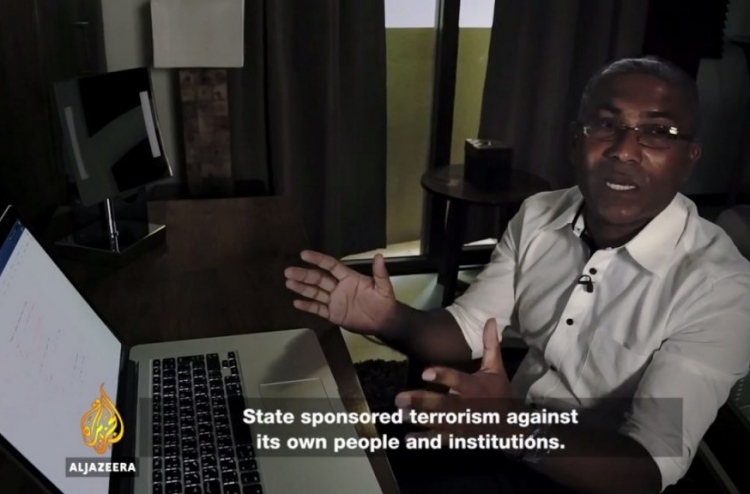
Ex-Auditor General Niyaz, who was ousted through amendments to the Audit Act. He was ousted for investigating the MMPRC scandal. Source; The Edition
Most of what is listed under this category has to do with governance, transparency, and accountability of elected officials and independent institutions that are the guardians of the democratic system. President Yameen’s five years in office has ensured that corruption become endemic, institutionalized, and the accepted norm owing to various rhetoric used by government officials to justify this atrocity. Statements like, “there is development even if there is corruption”, or “corruption is a bi-product of development”, or “we spent double the amount it would have incurred to speed up the implementation” – these are all designed to make norm of a practice that rips off a country’s wealth and destroy its future.
- Lack of confidence in long term viability and sustainability of developmental projects: in the era of sustainable development which refers to development that does not put into peril the future of generations to come; these five years have seen a lot of tussle between the government, institutions, and the citizens owing to harmful developmental practices, often bogged down in bureaucracy and the state’s refusal to divulge actual details of projects being undertaken.
Mahaa Jarraaf, the dredger that was purchased by MTCC to reclaim land to pave the way for infrastructural development, is destroying many a reef along with habitats and entire ecosystems, while lining the pockets of the movers and shakers of the country with cash.
President Yameen who exhibits characteristics similar to that of President Donald Trump as a climate change skeptic, during the presidential “debate” held by the Maldives National University (MNU), stated that he was actually doing the citizens a favour by reclaiming land from areas which had been dump grounds of waste for many years.
Foregoing the advice of the Environmental Protection Agency (EPA), projects have proceeded in the fashion that is one hundred percent reminiscent of this government. Furthermore, many of the projects that had been implemented, have been riddled with a host of problems owing to use of poor quality construction materials and lack of proper management, leading to an increasing loss in public confidence in government projects. - Lack of Transparency: Projects, finances, and under the table deals; all of this and more remains under a shroud of secrecy when it comes to incumbent regime. Expenditures incurred for mega projects revealed by the government are hardly trustworthy given the contradicting statements often quoted from different key figures within the President’s inner sanctum.
Mandates of different agencies often crisscross; it is normal for us to see the Fisheries Minister Dr. Mohamed Shainee handling matters related to the foreign policy of the country, taking a leading role where in reality the Minister of Foreign Affairs should. This leads to a lack of public trust in officials, both elected and otherwise who are touting the government’s message, leading to further issues when it comes to understanding the integrity of the government and its officials. - Derailment of Decentralized Governance: From the very early days of this government, the Decentralization Act and the powers that it bestows upon the people has often being met with scorn and ridicule from officials associated with the regime. Cited often as a failed policy, little is however said of the various policies of the incumbent regime that forced Decentralization Act to lose its prominence and power. This has rendered the councils to flounder and become ineffective, without proper budget and the central government’s support to take their plans forward.
Recently at the MNU debate, President Yameen professed to be a non-believer of decentralization governance in the current context of the country. He mentioned that with the levels of awareness of the public and officials as they are, it is mighty difficult to work alongside with the councils who give into partisan politics and make things extremely challenging in terms of implementation of projects.
While I believe this to be true regardless of which political party is in power, this toxic environment is further helped along by the divisive attitude of the incumbent regime at large.
The Local Government Authority (LGA) in the meantime, headed by the Home Minister Azleen, is quick to penalize councilors and place them on suspension whenever they dare something that displeases the regime. The Decentralization Act was amended on 12th April 2017 to pave the way for the President to have full control of the board of LGA, which is tantamount to the President being in full control of the councils themselves.
- Lack of Accountability: President Yameen’s second VP Ahmed Adeeb, who has many charges against him for embezzlement of state funds, became the scapegoat for a lot of scandals surrounding the government, especially in terms of the massive corruption implicating key figures of the regime.
Often at various podiums, the President deflects blame for what has taken place. This sentiment was echoed at the MNU debate once again, where the President shed light on how it was the “system” that had enabled the rise of someone corrupt like Adeeb through the ranks to become the VP, and at the same time steal so much money from the state funds.
Investigations carried out by the “independent” organizations are more often than not, based on political affiliation. The minute you switch your political allegiance to what is favoured by the regime, away goes that pesky little problem, or some coffee just happens to accidentally spill on the case file.
Anyone who dares rise against the tide is quickly snuffed out by levying hefty jail terms to silence other whistle-blowers who might come forward, making an example of people such as Gasim Abdul Kareem, who was arrested in February of 2016 for leaking detailed bank statements of SOF Pvt. Ltd., that is at the centre of one of the biggest cases of grand corruption that has taken place in the country.
For the people, there are no avenues left to turn to for justice. The entire country is left in a limbo, and the people are helpless in the face of the many grave atrocities that are being committed without shame and paraded in front of citizens, daring a response from anyone who is brave enough to weather the storm.
- Erosion of Democratic Norms, Values, and Institutions: I have always held the belief that President Yameen is a page right out of President Maumoon’s handbook. President Yameen has taken the ideals of the dictatorial regime that he himself served in many capacities, and almost perfected them to a sense to ward off any means that can hold him accountable.
Fear mongering is an age old tactic as such, used by his half-brother to keep people in line. By dangling the security of their jobs in front of them, President Yameen uses at times a more sophisticated and bull-headed approach to do the same.
Changing laws to suit circumstance, Auditor General Niyaz was “fired” from his position through an amendment to the Audit Act which was ratified on 30th of October 2014.
Similar tactics have been used to keep other institutions in line, paving the way for erosion of all norms and values that is essential for the functioning of a healthy and vibrant democracy. - Politicization of Law Enforcement and Public Media: This is not a characteristic unique to just President Yameen’s government alone. Regimes that have come and gone have in one way or the other, influenced the functions of the law enforcement and public media to suit their needs.
President Yameen being part of the “accepted norm” therefore, should be of no surprise to citizens. However, as with everything else that is this government, the politicization has reached new heights, whereby it is now impossible to understand the structure under which officers of Maldives Police Service often operate.
In the months leading up to the elections set to take place on Sunday, police officers were “trained” to confront the people who might come out to the streets demanding for their “rights”.
Meanwhile, public media shamelessly continues to propagate campaign messages of the President, acting as the mouthpiece of the Progressive Party of Maldives (PPM), whereby it is often impossible to draw the line between the functions of Channel 13 (a pro government, privately owned channel) with that of the state TV channels PSM and Television Maldives.
The Despicable:
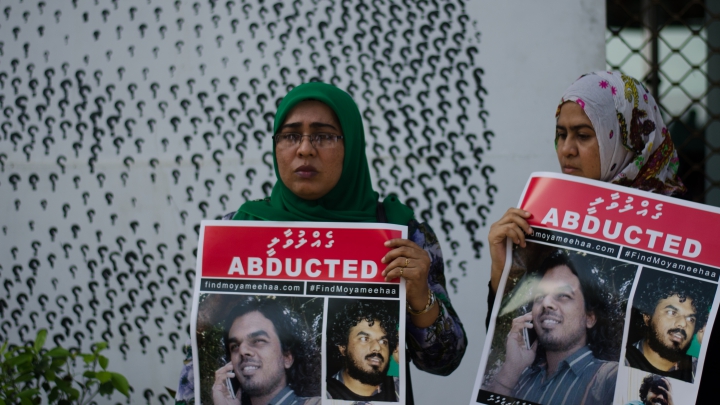
The most despicable aspect to the regime is its disregard to the sanctity and dignity of human life. Photo shows journalist Rilwan’s family members holding posters related to the #FindMoyameehaa movement. Source; Maldives Independent
President Yameen’s regime has definitely left its mark on the people in the five year period that he has been president. His MPs have zero shame, following in their leader’s footsteps, taunting citizens with just how untouchable they believe themselves to be. Sexual molestation cases submitted to law enforcement agencies have often being halted because of an affiliation the accused has with a key member from PPM. Similarly, when it comes to the sanctity and dignity of the human life, this is where the government’s actions are unconscionable and most despicable. According to Mv Murders, a total of 27 murders have taken place in the Maldives between 2014 to-date, most of which bear strong evidence of being gang related. However, the President continues to deny the existence gangs, and goes as far as to tell us that they are contributing members of society. Here I list some of the most despicable aspects of this five year regime. I am sure I must have missed out on many, because there are just too many to pick and choose from.
- Massive Corruption & Embezzlement of State Funds: No scandal has rocked this regime’s boat more than it did with the MMPRC scandal. Auditor General Niyaz Ibrahim was “dismissed” owing to the investigations carried out to unearth what had taken place.
Having embezzled MVR 1.2 billion from state funds, the actual amount which Niyaz believes would be higher, the public has yet to see transparent investigations into the matter by relevant authorities. The police concluded a hastily conducted investigation which implicated VP Adeeb, and institutions like the Anti-Corruption Commission have been unable to come up with proper investigative reports that are credible on the matter.
It is evident that the government is hiding many facts surrounding the debacle, and Al-Jazeera’s investigations into the case with its documentary “Stealing Paradise” just drives home the point further.
What is more harrowing is the way this government continues to justify their actions, the President talking about the “demand” for speedier implementation of projects everywhere in the country. - Deterioration of Justice, Law and order: Justice in this country has more or less always been the right of the affluent few. It is often said that justice in the Maldives is for the highest bidder.
Our courts remain trapped inside a vicious cycle of corrupt practices, and our law enforcement remains under the control of politicians who dictate what investigations should be carried out, when they should be carried out, and where those investigations should lead them.
Listed are some of the most prominent cases that have come and gone in the five year period, which have left its ugly mark on the country as a whole.- Rilwan’s disappearance and government’s reaction, gross mishandling, and miscarriage of justice that followed is one of the most prominent under this category. The callous disregard of elected officials aligned with the government towards the family seeking answers, the mockery and insults that have been hurled towards them and Rilwan’s friends, all lead one to circle back to the point that Rilwan’s abduction was state endorsed.
Four years since Rilwan was last seen at the Hulhumale’ Ferry Terminal, there have been many instances for the public to mistrust the government and its actions surrounding the case, ranging from the President’s dismissive attitude when questioned about it, to the verdict from the Criminal Court recently on the case, where the judge criticized the prosecutors for doing a half-assed job of making a conviction.
- Blogger Yameen Rasheed’s murder and the fallout is another case worthy of mention. A prominent blogger and critic of the government, Yameen was one of the closest friends of Rilwan and one of the most active figures in holding accountable the concerned authorities of the government.
Murdered just as he reached home during the wee hours of the night, his murder has scarred many, put fear in the hearts of the most vocal in society, and done the job where corrupt practices fail when it comes to those with integrity.
The Maldives Police concluded their investigations and blamed religious elements for being responsible for his murder, an easy cop-out if ever there was one.
Come today, Yameen’s family members stand in solidarity with Rilwan’s and vice versa, knowing that justice is nothing but an oases on the scorching desert that is Maldives. - Politically charged trials and use of terrorism charges to put political opponents behind bars became the norm since 2013. Starting with the trial of former President Mohamed Nasheed which saw him sentenced to jail for 13 years on charges of terrorism on 13th March of 2015, this was rapidly followed in succession with the speedy trials of many high profile politicians, who have been given hefty prison sentences.
The most recent debacles saw former President Maumoon’s son Faris Maumoon, the MP for Dhiggaru constituency, held under imprisonment arbitrarily for months, followed soon with the incarceration of the Maumoon himself, on charges related to a “judicial coup” that had allegedly attempted to usurp President Yameen.
The international community at large have raised concerns which have gone unheeded, as President Yameen’s foreign policy of forging stronger ties with China has taken precedence, which helps Maldives turn a blind eye and a deaf ear to international condemnation. - Gang violence and preventing key policies from being implemented to curb and address the phenomenon; it was once again at the debate that was held recently by MNU that President Yameen stated that he does not believe that violent gangs operate in the Maldives. Going as far as to admonish the use of such a word that paints groups of youth in such a negative light, President Yameen makes light of the many investigations centred around the existence of such groups in society, the many murders that have been committed during this five year term, and even the disappearance of Rilwan himself that is connected to gang elements.
Furthermore, there is reason to believe that these gangs are infiltrated by those preaching religious extremism in a setting where the violent hate filled minds find a calling.
It was also President Yameen’s ex-Home Minister Umar Naseer, a hardliner when it comes to gang activity and drugs, who saw his powers reduced by the President during his term in office, which meant that he was prevented from issuing direct orders to police officers in any sort of operation that was being carried out.
This change in mandate was allegedly owing to Naseer’s investigations into then Tourism Minister Adeeb for his alleged unlawful activities, a man who was suspected of having ties to gangs himself.
- Rilwan’s disappearance and government’s reaction, gross mishandling, and miscarriage of justice that followed is one of the most prominent under this category. The callous disregard of elected officials aligned with the government towards the family seeking answers, the mockery and insults that have been hurled towards them and Rilwan’s friends, all lead one to circle back to the point that Rilwan’s abduction was state endorsed.
- Criminalisation of Defamation: 11th of August 2016 saw President Yameen sign into law, a draconian bill that sets hefty fines and jail terms on journalists, if found guilty of slander. Following this, RajjeTV has borne the brunt of the heftiest of fines, followed by Villa TV owned by Qasim Ibrahim. This has created an environment of fear, where hesitancy to write about what matters is quickly becoming the norm.
- Constitutional amendments that became everyday business: President Yameen always boasts of how his government does everything within the boundaries of the laws in place. Easily said, when the said laws are changed to suit circumstance and need of the regime, at the President’s whim.
In line with this, constitutional amendments, which requires two-third majority of the sitting Majlis became an “everyday” phenomenon. At first, it was to pave the way for then Tourism Minister Adeeb to become the next VP, the amendments at the time which also saw new age limits being set for presidential candidates. Furthermore, constitutional amendments also paved the way for sale of Maldivian land to foreign investors, a move that saw the split between President Yameen & his half-brother become prominent.
With all that has happened, there remains the fear that more amendments along these lines will come in the course of the next few years, if President Yameen manages to secure his second term in office.
Critics say that we would most likely see the removal of the term limit for the presidency, alongside with amendments to the requirement of the two-third majority of the sitting Majlis needed for Constitutional amendments.
Furthermore, we have also seen President Yameen’s regime use the military to control the Parliament and storm the Supreme Court premises, which saw the arrest of two Supreme Justices for being party to a plan set to reverse the tide of strong arm tactics being used by a presidency riddled with legitimacy issues, dodging one scandal after another. I believe that the fate which awaits us would be much worse, if the next five years are handed to him on silver platter.
My compilation is paltry in the face all that has happened during the last five years. But it is a starting point for anyone who wants to know more, in order to perhaps make an informed decision, before heading to the polls on Sunday.
“Courage is not the absence of fear, but rather the assessment that something else is more important than fear.” ~ Franklin D. Roosevelt
